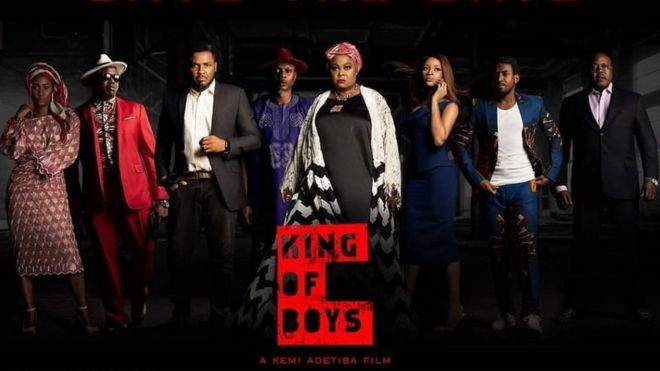The King of Boys movie made the Nigerian cinemas in 2018 and by 2019 it was on Netflix. The movie is coming back on Netflix on August 27, 2021, as a 7-part series and a Netflix original production and not as a Nigerian cinema production. This is an anticipated production from the Kemi Adetiba Visuals. I love Kemi Adetiba; and of course, the intelligence and creativity she employs in her productions, be it music videos, TV shows, and movies. Evidently, you will expect the best from this comeback production. But before the premiere of this comeback on Netflix (King of Boys: The Return of the King), I would like to assume that we have not had reviews that critique how the movie in detail depicts the Nigerian political scene.
The movie showcases a political world where money laundering, stealing, killing, corruption, nepotism, power, bloodthirst, religiosity, voodoo, and selfishness are the order of the day. Likewise illustrating, the level of perversion of traditional rulers with the character of Are Akinwande (acted by Akin Lewis) who also determines who gets elected into a political position. Even in these perversion and evil deeds, many politicians oftentimes, find their way to the churches or mosques for prayers while also seeking spiritual fortification from extraterrestrial forces. Recently, someone asked me how a certain prophetess is highly connected to politicians and aristocrats in Nigeria. My response to him was that most times, politicians go to this person for prayers hence, her connection with them. For instance, the protagonist, Alhaja Eniola Salami- The King (a character played by Sola Sobowale) visited prayer mountains and pastors. Also, in the Brabus Caucus, led by Alhaja Eniola Salami, there was an Apostle amongst the members. This goes on to tell more about Nigerian society and its association with religion. Moreover, this is in the hope that their daily dealings would be blessed and that the political position that they seek would be won.
The King, Eniola Salami dealt in drugs and laundered money but on the surface, she is a rich businesswoman who has a fabric shop, an oil company, a water bottling company, a bakery amongst other businesses. The businesses are used as a coverup. This is also the case for many of our politicians who make oil businesses, hotel businesses, and other businesses to be the face of what they do. After all, if you would probe them, you will only probe from what you can see not what you cannot see.
The Nigerian Corruption Crime Commission (NCCC) is a pseudo of the Economic Financial Crimes Commission (EFCC) and Independent Corrupt Practices and Other Related Offences Commission (ICPC) in Nigeria. The movie displays the typical plight of average Nigerian civil servants. This includes being underpaid which makes them resort to seeking quick wealth such as bribes from corrupt politicians and criminals within the society while subjecting themselves to the carnality of politicians. For instance, Mr. Gobir (a character played by Paul Sambo) could not buy his wife an expensive drug for treatment which was due to the lack of finance. Mr. Gobir was later mocked by his boss inspector Shehu when he questioned his involvement in the roping of Alhaja Eniola Salami. Also, Inspector Shehu in pursuit of riches fell to the antics of Makanaki (a character played by Reminisce) and Are Akinwande by roping Eniola Salami in a crime she never committed which then led to the loss of her children. In his defense, inspector Shehu lamented that his income was extremely low and was barely enough to feed him and his family. However, the money he received from the politicians has helped him to be able to cater to the needs of his family and himself.
Aside from these obvious representations of the Nigerian political terrain by Adetiba, a unique aspect of the movie is Adetiba’s use of the sound effect. I actually do not know what it is called by filmmakers or theatre students but I will call it a subtle sound effect. I believe the subtle sound effect was employed to catch viewers unawares, calm their tension, and blur their sense of deep reasoning while watching the movie. Unlike many Nigerian movies, impending chaos is announced with loud anxiety-filled sound-effect. I presume this was intentional and was done to obscure the viewers’ sense of feeling and not awaken them quickly to what is happening. This sound effect I guess was to make viewers continue watching the movie while as well employing flashbacks to allow for the deep reasoning. But not while they watch, but after they are done watching the movie. More so, the fact that the movie representations are a portrayal of the Nigerian society, hence the use of a subtle sound effect as a distractive device.
Overall, as average Nigerians, we all know what to expect during elections: stealing, kidnappings, hooliganism, and more. Not forgetting, the perpetual enemy of the Nigerian state, corruption. Adetiba gives a didactic, cinematography-rich movie with the King of Boys. What do you think we should expect in King of Boys: The Return of the King? A Similar storyline or a more poignant exposee into the Nigerian political scene? At this point, I rest the discussion and I await Friday, August 27, 2021, for what tends to be a continuation of a sequel called Nigeria.


An insightful and beautiful review. KOB is more than a movie to me. Started watching the sequel yesterday and I’m so proud of Kemi Adetiba!
Well done Fisayo
This review is very insightful. I have see the movie but I didn’t think too much of the information it’s passed